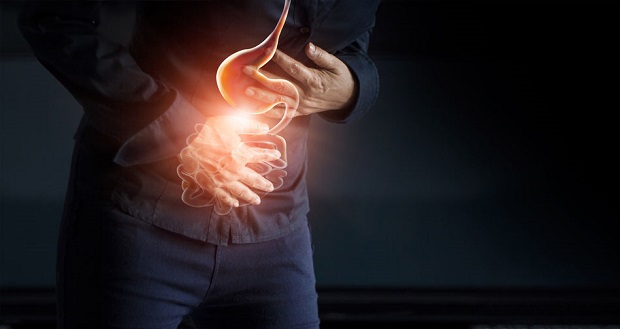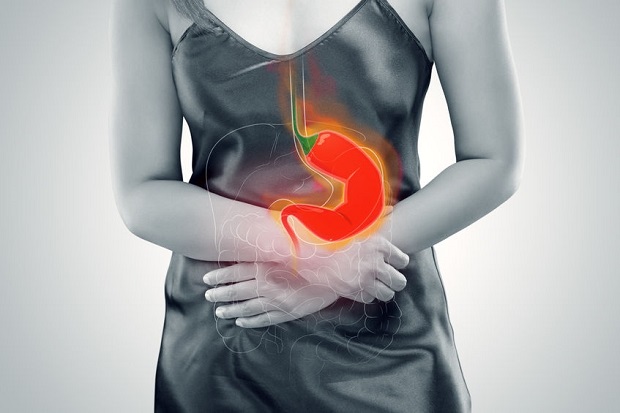
Peptic ulcers, more commonly referred to as stomach ulcers, occur when sores form in the lining of the stomach and the first part of the small intestine, or the duodenum. According to Harvard Health, one in ten people is affected by a peptic ulcer at some point. [1]
Ask ten people what causes peptic ulcers, and you will likely get just as many varied responses. Let’s look at the most common beliefs about how peptic ulcers form and the truth behind them.
Quick Overview:
Stomach Ulcers Are Caused By:
Stomach Ulcers Are NOT Caused By:
Can Medication Cause Stomach Ulcers?

According to the American College of Gastroenterology, one of the two “most important” causes of ulcers is the class of medications called NSAIDs (Non-Steroidal Anti-Inflammatory Drugs) used to treat pain, lower fever, and reduce inflammation. These include aspirin, ibuprofen, and naproxen. People who take these medications at high doses and/or for a prolonged period are at a higher risk for ulcers. [2]
NSAIDs tend to cause inflammation of the GI tract lining and several changes within the stomach, including less mucus production, reduced blood flow to the stomach, and less cell reproduction and repair. [3]
Helicobacter pylori Infections Cause Stomach Ulcers
Another of the two most important causes of peptic ulcers is Helicobacter pylori infection, a bacterium that lives in the stomach of infected people. It produces an enzyme that makes stomach acids less acidic, weakens your stomach lining, and causes your stomach to produce more acid. [4]
Can You Get Stomach Ulcers from Stress?

It’s no wonder that this question is contentious. Several studies have concluded that there is a link between ulcers and stress. [5][6]
However, most authoritative sources maintain that stress is not a cause factor. The American College of Gastroenterology states that “ulcers are not caused by emotional “stress” or by worrying.” Harvard Health states, “Despite the popular belief that ulcers are a side effect of living a high-pressure life, experts no longer believe that stress causes ulcers — although it may make a person more sensitive to the pain of an ulcer.” [7][8]
Can Spicy Foods Cause Stomach Ulcers?

Authoritative sources at Cedars Sinai and The Ohio State University Wexler Medical Center report that spicy foods do not cause ulcers. However, they may irritate the condition in those already suffering from an ulcer. [9][10]
Can Coffee Cause Stomach Ulcers?

Many studies have debunked the belief that coffee causes stomach ulcers. [11][12][13]
One academic paper surmised that the adverse effects of caffeine on various upper gastrointestinal diseases are the reason that many believe that coffee causes peptic ulcers. [14]
Can Alcohol Cause Stomach Ulcers?

According to the results of a national survey utilizing a large representative sample of the U.S. population, though excessive alcohol consumption can damage the stomach lining by impairing the integrity of the mucosal barrier, results indicated that alcohol consumption only minimally increased the odds of peptic ulcer. [15]
Interestingly, a study published in Epidemiology concluded that consuming a moderate amount of alcohol may help rid the stomach of Helicobacter pylori, the bacterium that is one of the major causes of peptic ulcers. Because alcohol has “strong antimicrobial activity and stimulates gastric acid secretion,” the researchers set out to see if moderate consumption would affect the bacterium that attacks the stomach lining of those infected. The researchers found that a glass of wine (20 grams) decreased the risk of H. pylori infection by 35%. [16]
Resources
- [1][8] Harvard Health Publishing – Harvard Medical School – “Peptic Ulcer.“
- [2][7] American College of Gastroenterology – “Peptic Ulcer Disease.“
- [3][9] Cedars-Sinai – “Ulcers.“
- [4] John Hopkins Medicine – “Helicobacter Pylori.“
- [5] Levenstein, Susan, “Psychological Stress Increases Risk for Peptic Ulcer, Regardless of Helicobacter pylori Infection or Use of Non-steroidal Anti-inflammatory Drugs,” Alimentary Tract; Volume 13; Issue 3; p498-506.e1, March 2015
- [6] Deding, Ulrich, “Perceived stress as a risk factor for peptic ulcers: a register-based cohort study,” BMC Gastroenterology, 16, Article number: 140 (2016)
- [10] Ohio State University Wexner Medical Center – “Peptic Ulcer Disease.“
- [11 ] Gary D. Friedman, M.D., M.S., “Cigarettes, Alcohol, Coffee and Peptic Ulcer,” New England Journal of Medicine, Vol. 290 No. 9; 1974
- [12][14] Shimamoto, Takeshi et al. “No association of coffee consumption with gastric ulcer, duodenal ulcer, reflux esophagitis, and non-erosive reflux disease: a cross-sectional study of 8,013 healthy subjects in Japan.” PloS one vol. 8,6 e65996. 12 Jun. 2013, doi:10.1371/journal.pone.0065996
- [13] Elta, G H et al. “Comparison of coffee intake and coffee-induced symptoms in patients with duodenal ulcer, nonulcer dyspepsia, and normal controls.” The American journal of gastroenterology vol. 85,10 (1990): 1339-42.
- [15] Chou, S P. “An examination of the alcohol consumption and peptic ulcer association–results of a national survey.” Alcoholism, clinical and experimental research vol. 18,1 (1994): 149-53. doi:10.1111/j.1530-0277.1994.tb00895.x
- [16] Brenner, H et al. “Alcohol consumption and Helicobacter pylori infection: results from the German National Health and Nutrition Survey.” Epidemiology (Cambridge, Mass.) vol. 10,3 (1999): 214-8.
DISCLAIMER: THIS WEBSITE DOES NOT PROVIDE MEDICAL ADVICE
The information, including but not limited to text, graphics, images, and other material on this website, is for informational purposes only. No material on this site is intended to be a substitute for professional medical advice, diagnosis, or treatment. Always seek the advice of your physician or other qualified healthcare providers with any questions you may have regarding a medical condition or treatment before undertaking a new healthcare regimen, and never disregard professional medical advice or delay in seeking it because of something you have read on this or any other website.





